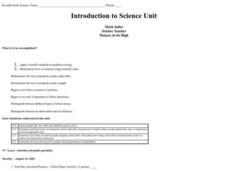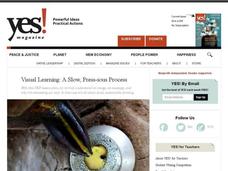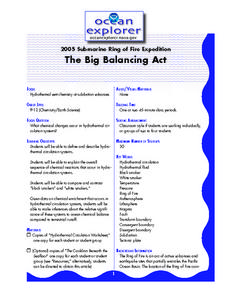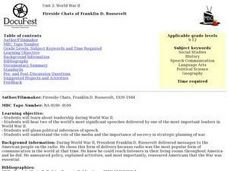Curated OER
Ancient Civilizations: Medieval and Early Modern Times
Seventh graders gain an understanding of the history of Mongolian culture through making inferences about Mongolian artwork
Curated OER
Learning from Artifacts Uncovering Clues, Large and Small
Learners observe artifacts from Fort St. Louis at a website in order to make inferences about the people who lived there. They paint pottery in the style which might have been used by one of the cultural groups who inhabited the fort.
Curated OER
Acid Precipitation
Young scholars test the acidity of unknown solutions. They use this information to make inferences from data given from recorded rainfall records to identify areas that receive the most acid rain.
Curated OER
Introduction to Science
Seventh graders investigate scientific methods to solve problems. They demonstrate creating data tables and graphs. They study the role of a scientist and the importance of safety in a science lab. They distinguish between an...
Curated OER
A Pocketful of Change
Students study the meaning, symbolism, and value of U.S. coins,
especially the quarter. They conduct a survey of coins in students'
possession, graphing the results to show frequency distribution and drawing
inferences about the U.S....
Curated OER
Statistics and Probility
Seventh graders collect data and make predictions. In this geometry lesson, 7th graders work in tiers collecting data and plotting it. They make inferences and predictions about their collected data.
Curated OER
Visual Learning: A Slow, Press-ious Process
Students observe a photograph and make inferences. In this investigative lesson students study how to find facts in pictures and draw inferences from them.
Curated OER
Inquiry Lesson About Color
Students investigate the color choices artists make in their work, and to practice the scientific process of predicting, observing, inferring, and interpreting. This lesson's purpose is to prepare students for a museum visit.
Curated OER
Investigation 4 - Dinosaurs Tracks
Fourth graders make inferences and interpretations from sets of dinosaur tracks. They describe Utah fossils and how they were formed. Partners trade their sketches of tracks and try to guess which dinosaur it belonged to.
Curated OER
Collaborative Book Club Groups
Students participate in book club forums where they write descriptive, evaluation, analysis, synthesis, or inference essays. They take on the role of a character in their bok and publish a web page.
Curated OER
Clues to the Past
Students analyze how arhaeologists study the past. They define basic archaeological terms, make general inferences from observations, and explain the importance of context.
Curated OER
Are You Related?
Students study microsatellite markers and explain how they might be used to identify populations. They use data to make inferences about the populations of deep-sea corals.
Curated OER
2005 Hidden Ocean Expedition What's Eating You?
Analyze data and make inferences about the trophic position of organisms in the Canada marine food web. After a review of the geography and formula, discuss results and write an essay to improve the understanding of Artic food webs.
Curated OER
The Big Balancing Act
High schoolers describe chemical changes occurring in hydrothermal circulation systems. They make inferences about the significance of these systems to ocean chemical balance compared to terrestrial runoff.
Curated OER
Fireside Chats of Franklin D. Roosevelt
Young scholars view a film about Franklin D. Roosevelt and his fireside chats. THey identify political inferences in his speeches and how the media played an important role in the war. They answer questions to complete the lesson.
Curated OER
Serach for the Lost Cave People
Learners examine primary source documents to draw inferences about 17th century American colonists.
Curated OER
Reading And Responding: Lesson 15 Nonfiction
Eighth graders examine a nonfiction selection in a teacher led lesson. They examine the author's purpose for writing the selection and identify the difference between fact and opinion. The compare and contrast expository and narrative...
Curated OER
Testing Foods
Students perform an experiment using brown paper bags to determine which foods have oil in them. This task assesses student's abilities to make simple observations and inferences from them.
Curated OER
Color Dots 3
Students make simple observations, test mixtures, and make generalized inferences from their observations. They observe bleeding of colored inks with water.
Curated OER
Pulse
Students determine a baseline pulse rate then chart the changes in rate with exercise. They describe the changes and develop a rationale for their observations. The task assesses students' abilities to make simple observations, determine...
Curated OER
Finding Buck Henry
Students read and demonstrate competence in the general skills and strategies of the writing process via the novel "Finding Buck Henry." They recognize complex elements of plot. Students analyze devices used to develop characters in...
Curated OER
What Happens on Average
Fifth graders are introduced to convergence of sequences based on averaging previous terms in the sequence. The power of the "fill-down" function in spreadsheets is exploited. By using various starting numbers, and inferring the limit,...
Curated OER
Hurricanes in History:
Students interpret data displayed in a graph, make inferences based on graphical data. They work in pairs or groups to interpret graphs containing historical data of hurricanes, and then answer questions that assess their understanding...
Curated OER
Every Breath You Take
Students explore the nature of the air we breathe by observing petri dishes that have accumulated particulate matter from the atmosphere. Students make mathematical calculations and inferences about the effect of this matter on...
Other popular searches
- Making Inferences Worksheet
- Observation and Inferences
- Making Inferences in Reading
- Reading Making Inferences
- Making Inferences Grade 2
- Making Inferences Stories
- Lesson Making Inferences
- Inferences and Context Clues
- Generalizations / Inferences
- Inferences in Reading
- Reading Inferences
- Making Inferences 3rd Grade

























